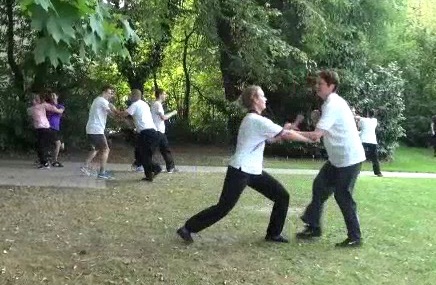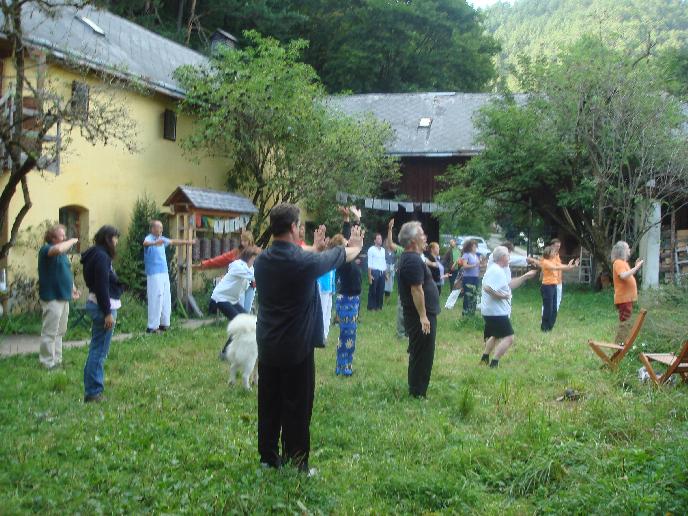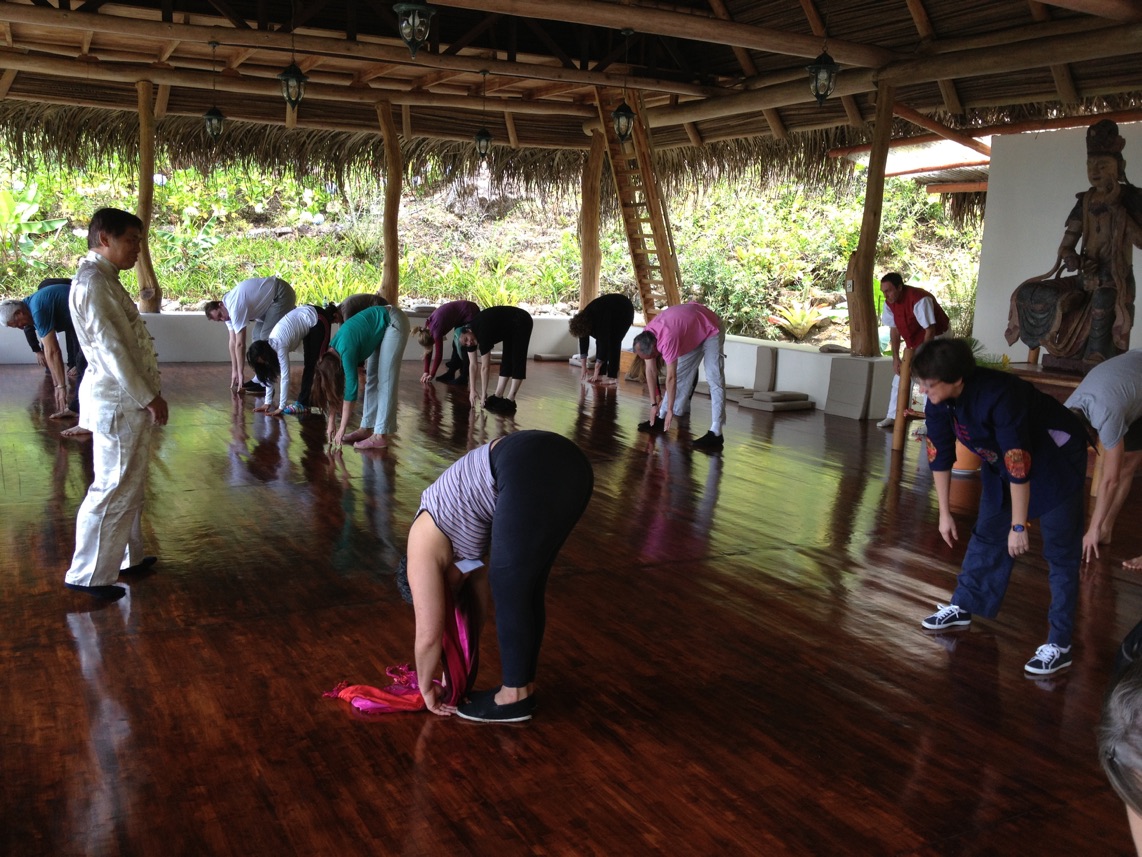SELECTION OF QUESTIONS AND ANSWERS
AUGUST 2016 PART 2

Combat Application of Seven-Star
Question 1
A Chinese doctor who treats my wife knows what type of energy emits from which organ, and how strong the energy is.
— Rodrigo, Spain
Answer
This is not important. What is important is that he can cure your wife of cancer, but he hasn't.
Suppose a healer just pats your wife on her back three times, and she is cured. It really doesn't matter what the healer knows or does not know. What matters is that your wife is cured.
When you ask him how much the healing fee is, he says it's 5000 euros.
"What? 5000 euros for patting my wife three times on her back!" you exclaim.
"No," he answers, "it's not for patting her. It's for curing her of cancer."
Question 2
When we practice Seven-Star we become direct. I am concerned that this may be detrimental to my relationship with my wife as she prefers the soft approach.
— Herman, Switzerland
Answer
Being direct does not mean that you cannot use the soft approach. You can be direct and at the same time be very gentle.
In situations when you feel that being indirect is better, you need not be direct even when you have this ability. To be direct is a very beneficial ability which you can apply when situations are appropriate. When situations are not appropriate for being direct, then you need not use it.
As an analogy, having a car is very beneficial. But when it is more appropriate to walk to your friend's house instead of driving there, you can leave your car at home and enjoy some walking.

An effective way to prevent over-training is to perform chi kung exercises at a physical level
Question 3
Sigung, you have emphasized again and again that we must not over-train as over-training can bring much harm. How do we prevent over-training?
— Jan, Switzerland
Answer
The answers below are applicable to practitioners in our school. They may not be applicable to other practitioners.
Here are three progressive steps to prevent over-training.
- Don't enter too deeply into a chi kung state of mind. When you do not enter deeply into a chi kung state of mind, but still find yourself over-training, go to the second step.
- Don't enter into a chi kung state of mind. Just start your training straight-away. Even when you do not take time to enter into a chi kung state of mind, because you have been initiated, you will still perform your exercise in a chi kung state of mind. If you still find yourself over-training, go to the next step.
- Perform negative actions. As these are negative actions, do them only when necessary. Purposely tense your muscles, or purposely intellectualise. Do them slightly and only occasionally so that they can prevent you from over-training by reducing or stopping the tremendous internal force that you can generate. Have a gentle chi flow at the end of the training session to erase harmful effects from the tensing and intellectualising. If this step does not work for you, stop your training for a few days. Resume your training when you don't feel the unpleasant symptoms of over-training.
Question 4
What should we do when we have over-trained?
Answer
Firstly, you should reduce your training, even when you enjoy it. This can be done in two approaches, quantitatively and qualitatively. You can reduce the time of training or you can reduce the intensity.
If you train for an hour everyday, reduce it to half an hour. If it is still powerful, you can train every alternate day.
Secondly, perform your chi kung or kungfu in a shallower chi kung state of mind. If it is still powerful, perform your chi kung or kungfu at a physical level.
Spend more time outdoors with your family or friends. Go for outings, play games or go shopping or window-shopping.
Practicing kungfu sets or combat sequences will help to use the excess energy and help to reduce over-training. Practice dynamic kungfu, not quiescent kungfu that develops internal force.

Bear Walk
Question 5
When performing Embracing Buddha and Bear Walk of the 18 Jewels, how wide should the feet be apart? When should we lift up one leg when performing Bear Walk.
— Pablo, Spain
Answer
In Embracing Buddha you stand with feet together. In Bear Walk, the feet are about a shoulder's width apart. The feet can also be about a shoulder's width aprat in Embracing Buddha.
In about 30 repetitions of Bear Walk, both feet should be on the ground when shifting the body weight from one leg to another in the first 10 repetitions. Then the heel of each alternate leg should be raised for the next 10 repetitions. The whole foot should be alternately raised for the third 30 repetitions.
In my early years of teaching, because I wanted students to go to chi flow as soon as possible, I advised them not to pay undue attention to the form. Now, with the tremendous improvement of my teaching methodology, students progress very fast to the extent that I have to warn them not to over-train. Paying attention to the form is one way to prevent over-training. When students pay attention to the form, they tend to be less deep in their chi kung state of mind.
Question 6
Can we combine exercises from the 18 Jewels with exercises from 18 Lohan Hands?
Answer
Yes, you can.
You can choose one or more exercises from the 18 Jewels to combine with one or more exercises from 18 Lohan Hands in the same training session. But irrespective of how many exercises you perform in one training session, the session should remain at about 10 minutes. (Previously I advised a session to be about 15 minutes. But with improvement in our efficiency, we can now practice for just 10 minutes a session.)
You can combine any exercises from any chi kung art with any exercises from any other chi kung art in any order. You may, for example, perform Bone Marrow Cleansing at the Skin Level, followed by Rhinoceros Looking at Moon from 18-Lohan Art. Or you may perform Three-Circle Stance, followed by Three Levels to the Ground and Abdominal Breathing. But irrespective of whether you perform one or more exercises in any combination, the training session should be about 10 minutes.

Touching Toes
Question 7
I was initiated into a chi kung state of mind many years ago when I first learned from you. But I haven't practiced since then. Do I need to be initiated again?
— Lola, Spain
Answer
No, you don't have to be initiated again. Once you have been initiated, the skill of entering into a chi kung state of mine is yours. You may practice entering into a chi kung state of mind to enhance your skill, but you do not need another initiation.
It is like learning how to ride a bicycle. Once you have the skill of riding a bicycle, it is yours. You may stop riding a bicycle for many years, but when you try riding a bicycle again, you can do it though at first it may be awkward.
How do you know you don't need another initiation into a chi kung state of mind? It is simple. Perform any chi kung exercise to see whether you can have a chi flow.
Question 8
You said that the form was not important. In Touching Toes, how far should we bend down?
Answer
The form is also important but it is less important than energy flow. Entering into a chi kung state of mind is the most important.
If you are not in a chi kung state of mind, you won't be practicing chi kung though the techniques you use are genuine chi kung techniques. This is the situation of more than 80% of those who say they practice chi kung. Actually they use genuine chi kung techniques to perform gentle physical exercise, just like about 90% of Taiji practitioners use genuine Taijiquan techniques to perform external Taiji dance.
When performing any chi kung technique, you should perform it as best as you comfortably can. If you perform Touching Toes, you should bend down as low as you comfortably can to touch your toes, and not, for example, raise your hands to touch your head. You may not be able to touch your toes, but you try as best as you comfortably can. If you practice consistently, eventually you may be able to touch your toes, though initially you could not.
LINKS
Selected Reading
- Can We Learn chi Kung or Kungfu from Books, Videos or an E-mail?
- Tai Chi Chuan -- Classof 2006
- Revealing the Secrets of the Twelve Bridges of the Famous Iron Wire Set
- Shaolin 36 Leg Techniques
- Six-and-Half-Point Staff
